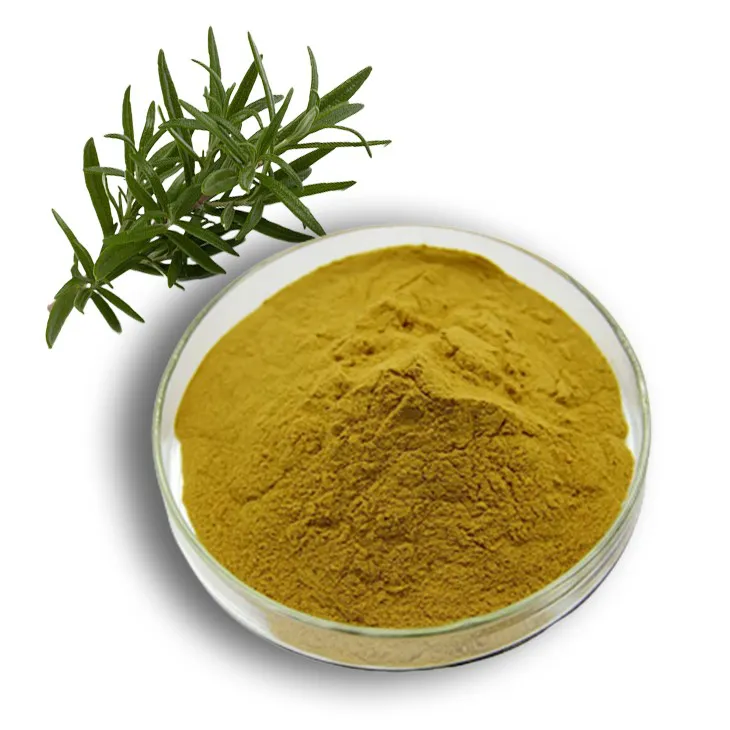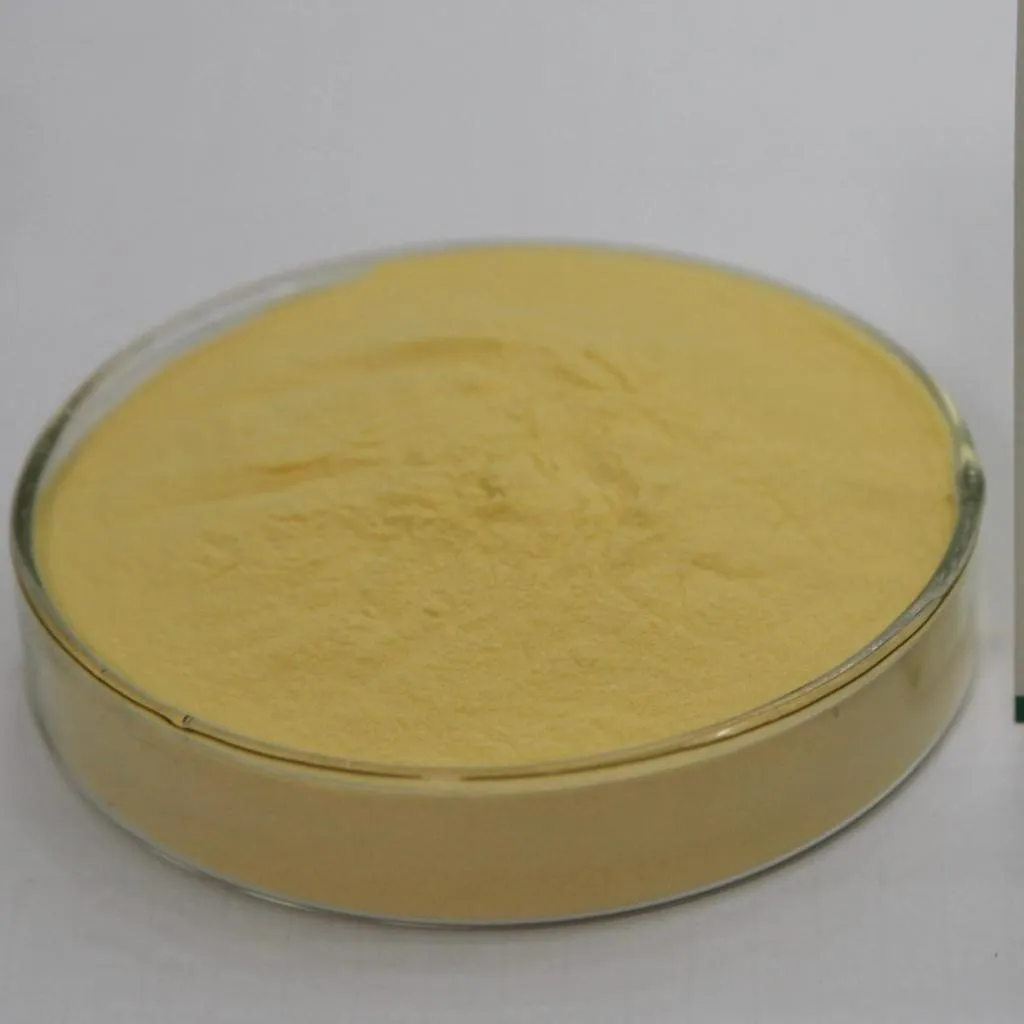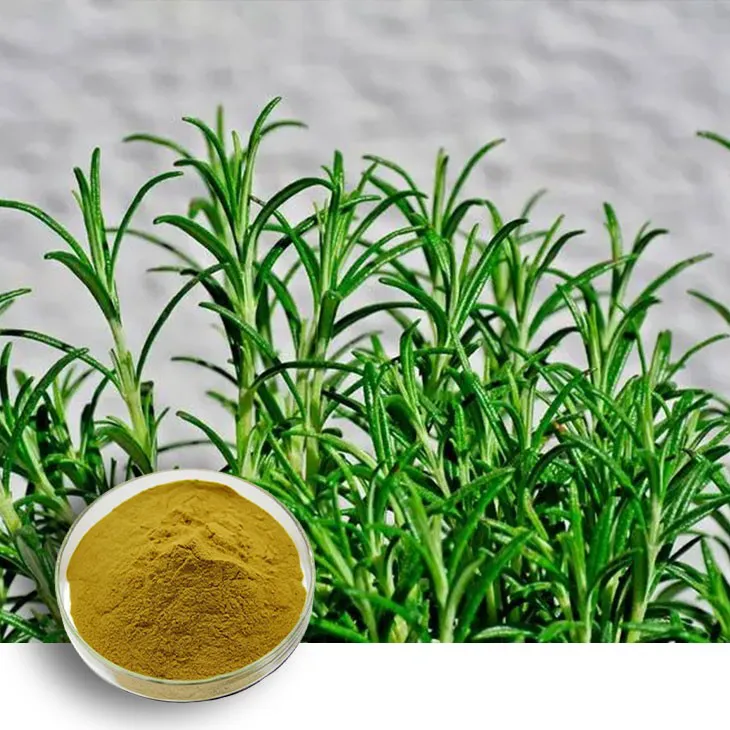- 0086-571-85302990
- sales@greenskybio.com
Is rosemary extract beneficial for diabetes? Are these all safe and applicable for diabetic patients?
2024-11-12

1. Introduction
Diabetes is a chronic metabolic disorder that affects millions of people worldwide. It is characterized by elevated blood glucose levels due to insufficient insulin production or ineffective insulin action. Management of diabetes often involves lifestyle modifications, medications, and in some cases, complementary and alternative therapies. Rosemary (Rosmarinus officinalis) is a well - known herb with a long history of culinary and medicinal use. Rosemary extract has been studied for its potential health benefits, including its role in diabetes management. In this article, we will explore the scientific evidence regarding the benefits of Rosemary extract for diabetes and assess its safety for diabetic patients.

2. Composition of Rosemary extract
Rosemary extract is rich in various bioactive compounds. These include:
- Rosmarinic acid: This is one of the major phenolic compounds in rosemary. It has antioxidant, anti - inflammatory, and antimicrobial properties.
- Carnosic acid: Another important phenolic compound, carnosic acid is also known for its antioxidant activity.
- Flavonoids: Such as apigenin and luteolin, which contribute to the overall antioxidant and anti - inflammatory effects of the extract.

3. Potential Benefits of Rosemary Extract for Diabetes
3.1. Antioxidant Activity
Oxidative stress plays a significant role in the development and progression of diabetes. High blood glucose levels can lead to the overproduction of reactive oxygen species (ROS), which can damage cells, including pancreatic beta - cells responsible for insulin production. Rosemary extract, with its rich content of antioxidants like rosmarinic acid and carnosic acid, can help combat oxidative stress. By scavenging ROS, it may protect pancreatic beta - cells from damage, thereby potentially improving insulin secretion. A study showed that rosemary extract supplementation in diabetic rats led to a reduction in oxidative stress markers in the pancreas, indicating its protective effect on beta - cells.
3.2. Anti - Inflammatory Effects
Chronic inflammation is closely associated with diabetes. Inflammatory cytokines can interfere with insulin signaling and contribute to insulin resistance. Rosemary extract has demonstrated anti - inflammatory properties. The phenolic compounds in the extract can inhibit the production of inflammatory cytokines such as interleukin - 6 (IL - 6) and tumor necrosis factor - alpha (TNF - α). In diabetic animal models, treatment with rosemary extract has been shown to reduce inflammation in adipose tissue and liver, two important organs involved in glucose and lipid metabolism. This reduction in inflammation may help improve insulin sensitivity in the body.
3.3. Glucose - Lowering Effects
Some research suggests that rosemary extract may have a direct impact on blood glucose levels. In vitro studies have shown that certain compounds in rosemary extract can stimulate glucose uptake in muscle cells, similar to the action of insulin. In diabetic rats, oral administration of rosemary extract has been associated with a decrease in fasting blood glucose levels. However, the exact mechanisms underlying these glucose - lowering effects are still being investigated. It may involve activation of glucose transporters or modulation of intracellular signaling pathways related to glucose metabolism.
3.4. Lipid - Lowering Effects
Dyslipidemia, characterized by abnormal levels of lipids such as cholesterol and triglycerides, is common in diabetes. Rosemary extract has been shown to have lipid - lowering properties. In animal studies, it has been observed that rosemary extract can reduce serum levels of total cholesterol, low - density lipoprotein (LDL) cholesterol, and triglycerides. This may be due to its ability to inhibit lipid synthesis in the liver and enhance lipid metabolism in adipose tissue. By improving lipid profiles, rosemary extract may contribute to reducing the risk of cardiovascular complications associated with diabetes.

4. Safety of Rosemary Extract for Diabetic Patients
4.1. General Safety
Rosemary is generally recognized as safe (GRAS) when used in culinary amounts. However, when it comes to concentrated rosemary extract, especially in the context of supplementation, certain considerations need to be made. In general, short - term use of rosemary extract at recommended doses has not been associated with significant adverse effects in healthy individuals or diabetic patients. But long - term safety data are still relatively limited.
4.2. Drug Interactions
One of the main concerns regarding the safety of rosemary extract for diabetic patients is its potential for drug interactions. Rosemary extract may interact with medications used to treat diabetes, such as:
- Anticoagulants: Rosemary contains compounds that may have mild anticoagulant effects. If a diabetic patient is taking anticoagulant medications (e.g., warfarin), the combination with rosemary extract could potentially increase the risk of bleeding.
- Hypoglycemic agents: Since rosemary extract may have glucose - lowering effects, there is a concern that it could interact with hypoglycemic drugs (e.g., metformin, sulfonylureas) and cause excessive hypoglycemia. Diabetic patients using these medications need to be closely monitored if they choose to take rosemary extract supplements.
4.3. Allergic Reactions
Allergic reactions to rosemary are relatively rare but can occur. Symptoms may include skin rashes, itching, swelling, and in severe cases, difficulty breathing. Diabetic patients who are allergic to plants in the Lamiaceae family (to which rosemary belongs) should avoid using rosemary extract.

5. Current Research Gaps
While there is some promising evidence regarding the benefits of rosemary extract for diabetes, several research gaps exist:
- Most of the studies have been conducted in animal models, and more human clinical trials are needed to confirm the efficacy and safety of rosemary extract in diabetic patients.
- The optimal dosage of rosemary extract for diabetes management has not been clearly defined. Different studies have used varying doses, making it difficult to recommend a standard dose.
- The long - term effects of rosemary extract on diabetes - related complications, such as diabetic nephropathy, retinopathy, and neuropathy, are largely unknown.
6. Conclusion
Rosemary extract shows potential benefits for diabetes through its antioxidant, anti - inflammatory, glucose - lowering, and lipid - lowering effects. However, its safety for diabetic patients needs to be carefully considered, especially in terms of potential drug interactions and allergic reactions. Given the current research gaps, more high - quality human clinical trials are required to fully understand the role of rosemary extract in diabetes management. Until then, diabetic patients should consult their healthcare providers before using rosemary extract supplements.
FAQ:
What is rosemary extract?
Rosemary extract is a substance obtained from the rosemary plant (Rosmarinus officinalis). It contains various bioactive compounds such as rosmarinic acid, carnosic acid, and others. These compounds are thought to have antioxidant, anti - inflammatory, and other potential health - promoting properties.
How might rosemary extract benefit diabetes?
Some studies suggest that rosemary extract may have benefits for diabetes. Its antioxidant properties may help reduce oxidative stress, which is often elevated in diabetic patients. Oxidative stress can damage cells and tissues, including those involved in insulin secretion and action. Additionally, it may have anti - inflammatory effects that could potentially improve insulin sensitivity. However, more research is needed to fully understand these mechanisms and their significance in diabetes management.
Is rosemary extract safe for diabetic patients?
In general, when used in moderation, rosemary extract is considered safe for most people, including diabetic patients. However, some individuals may be allergic to rosemary or its components. Also, high - dose or long - term use may have potential side effects, although these are not well - defined specifically in relation to diabetes. As with any supplement, it is advisable for diabetic patients to consult their healthcare provider before starting to use rosemary extract.
Can rosemary extract replace diabetes medications?
No. Rosemary extract should not be considered a replacement for diabetes medications. While it may have some potential benefits in managing diabetes - related factors, current diabetes medications are specifically designed to regulate blood glucose levels, and their effectiveness has been proven through extensive clinical trials. Rosemary extract can, at best, be considered as a complementary approach to diabetes management under the guidance of a healthcare provider.
How should diabetic patients use rosemary extract?
If a diabetic patient decides to use rosemary extract, they should first consult their healthcare provider. The appropriate dosage and form (e.g., capsule, tincture) may vary depending on individual factors such as overall health, other medications being taken, and the specific goals of using the extract. It is also important to source rosemary extract from a reliable manufacturer to ensure quality and purity.
Related literature
- The Antioxidant and Anti - Inflammatory Effects of Rosemary Extract in Diabetes Mellitus: A Review"
- "Rosemary Extract: Potential Benefits for Insulin Resistance and Diabetes"
- "Safety and Efficacy of Herbal Supplements, including Rosemary Extract, in Diabetic Patients"
- ▶ Hesperidin
- ▶ citrus bioflavonoids
- ▶ plant extract
- ▶ lycopene
- ▶ Diosmin
- ▶ Grape seed extract
- ▶ Sea buckthorn Juice Powder
- ▶ Beetroot powder
- ▶ Hops Extract
- ▶ Artichoke Extract
- ▶ Reishi mushroom extract
- ▶ Astaxanthin
- ▶ Green Tea Extract
- ▶ Curcumin Extract
- ▶ Horse Chestnut Extract
- ▶ Other Problems
- ▶ Boswellia Serrata Extract
- ▶ Resveratrol Extract
- ▶ Marigold Extract
- ▶ Grape Leaf Extract
- ▶ blog3
-
Cranberry Plants and Skin - care Products.
2024-11-12
-
Lycopene
2024-11-12
-
Pine bark Extract Powder
2024-11-12
-
Maca Extract
2024-11-12
-
Dan Shen Root Extract/Salvia Root Extract
2024-11-12
-
Agaricus Blazei Extract
2024-11-12
-
Garcinia Cambogia Extract
2024-11-12
-
Fenugreek Extract Powder
2024-11-12
-
Black Rice Extract
2024-11-12
-
Eucommia Ulmoides Extract
2024-11-12
-
Medicinal Marshmallow Extract
2024-11-12





















